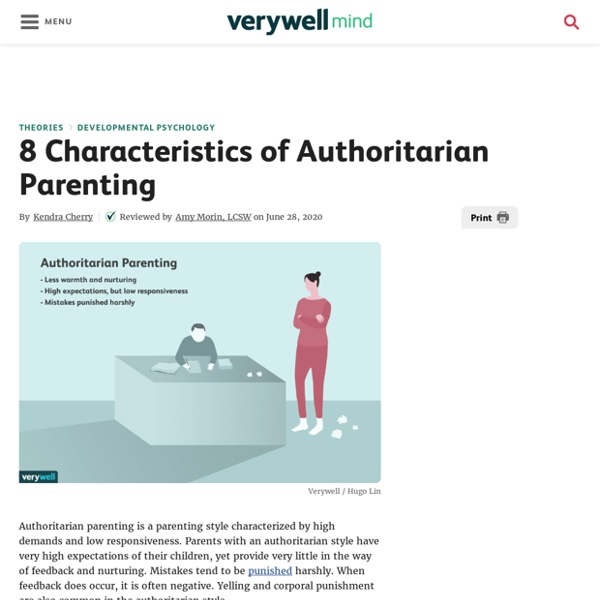Characteristics and Effects of Uninvolved Parenting
Uninvolved parenting, sometimes referred to as neglectful parenting, is a style characterized by a lack of responsiveness to a child's needs. Uninvolved parents make few to no demands of their children and they are often indifferent, dismissive, or even completely neglectful. The Major Parenting Styles During the 1960s, psychologist Diana Baumrind described three different parenting styles based on her research with preschool-age children: authoritarian, authoritative, and permissive parenting.
What Is Authoritative Parenting?
Authoritative parenting is characterized by reasonable demands and high responsiveness. While authoritative parents might have high expectations for their children, they also give their kids the resources and support they need to succeed. Parents who exhibit this style listen to their kids and provide love and warmth in addition to limits and fair discipline. This approach to parenting avoids punishment and threats and instead relies on strategies such as positive reinforcement.
4 Types of Parenting Styles and Their Effects on Kids
Your parenting style can affect everything from how much your child weighs to how she feels about herself. It's important to ensure your parenting style is supporting healthy growth and development because the way you interact with your child and how you discipline her will influence her for the rest of her life. Researchers have identified four types of parenting styles:1 AuthoritarianAuthoritativePermissiveUninvolved Each style takes a different approach to raising children and can be identified by a number of different characteristics. Authoritarian Parenting
Long-Term Effects of Strict Parenting
A person's parenting style can have a long-lasting impact on a child’s emotional, social and psychological development, so it is important to adopt the most effective style for you and your child. In her review on parenting styles, published in JSTOR.org, a digital library of books and academic journals, Diana Baumrind, a clinical and developmental psychologist, argues that parenting styles can determine the kind of person a child will become in adulthood. Strict or authoritarian parenting, for instance, may have benefits, but it can have negative long-term effects on a child’s personality.
What Is Permissive Parenting?
Permissive parenting is a type of parenting style characterized by low demands with high responsiveness. Permissive parents tend to be very loving, yet provide few guidelines and rules. These parents do not expect mature behavior from their children and often seem more like a friend than a parental figure. These parents tend to be the polar opposite of the so-called "helicopter parents." Instead of hovering over their children's every move, permissive parents are incredibly lax and rarely make or enforce any type of rules or structure. Their motto is often simply that "kids will be kids."
Why Parenting Styles Matter When Raising Children
Developmental psychologists have long been interested in how parents affect child development. However, finding actual cause-and-effect links between specific actions of parents and later behavior of children is very difficult. Some children raised in dramatically different environments can later grow up to have remarkably similar personalities. Conversely, children who share a home and are raised in the same environment can grow up to have very different personalities. Despite these challenges, researchers have posited that there are links between parenting styles and the effects these styles have on children. And some suggest these effects carry over into adult behavior.
12 Ways to Become a More Authoritative Parent
There isn’t a single formula for raising children well. After all, parenting isn’t an exact science. There’s definitely a bit of an art to good parenting. Researchers who examine parenting styles have consistently found authoritative parents raise happier and healthier children who are equipped to face real-world challenges. The good news is, everyone has the ability to become a more authoritative parent. And you can match authoritative parenting strategies to your child’s unique temperament to ensure you aren’t using a cookie-cutter approach to parenting.
Parenting Styles and Child Behavior — Psychology In Action
More extensive research is critical to enhancing the field’s current understanding of parenting styles and the role they play in child behavioral outcomes. An increased understanding of the roots of different parenting practices, may enable the field to more effectively address the environmental factors that lead parents to adopt less ideal strategies. This research should be used to guide the development of more effective prevention and intervention programs aimed at fostering adaptive behavioral development in children. Because parenting programs have been found to demonstrate a large and sustained effect on early disruptive behavior problems (Comer et al., 2013), it is important to ensure these programs are widely available to at-risk families, and that these families are aware of their availability.



